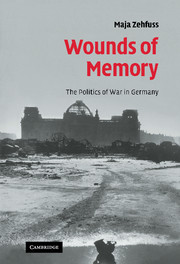6 - Memory, uncertainty, responsibility
Published online by Cambridge University Press: 22 October 2009
Summary
This book has explored how German memories of the Third Reich and the Second World War have been articulated in a variety of contexts. It has highlighted what one might call the double implication of speaking of the past. On the one hand, the book has examined the closures in such discourses, how they seem to rule out potential objections, thoughts and queries, in particular those that question how the past came to be the past in the first place. On the other hand, and crucially, the book has followed up how the invocation of memory inevitably offers opportunities to challenge the closures that are being produced, in particular when tensions are made visible. These tensions might at times be related to something as simple as the existence of a variety of memories of the past, but they also indicate that remembering retrospectively conjures up a past that never quite existed in this way when it was the present. In this final chapter, I draw out the wider implications of this argument, implications not only in relation to the particular political situation explored but also to wider questions about war and the practice of scholarship. Thus, rather than tying everything together into a neat bundle of conclusions that have already been shown, this chapter opens the arguments up to new questions, implications and challenges.
- Type
- Chapter
- Information
- Wounds of MemoryThe Politics of War in Germany, pp. 221 - 266Publisher: Cambridge University PressPrint publication year: 2007

